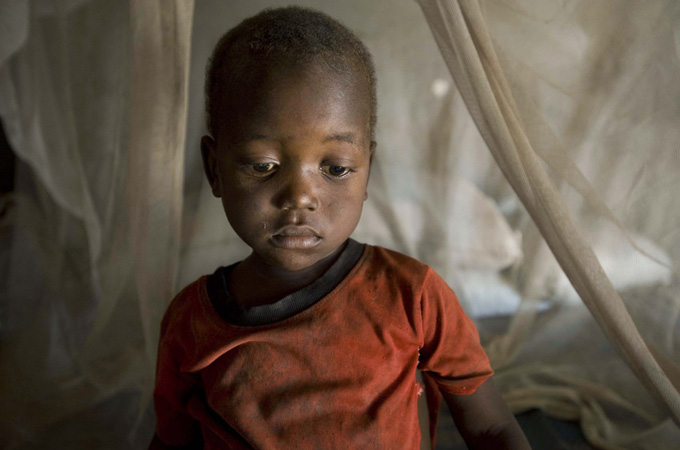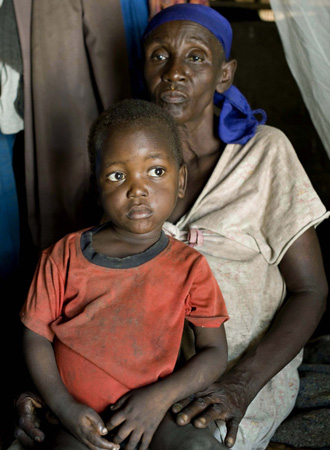
Aliaza: ‘My daughter died giving birth’
Aliaza’s daughter died giving birth. He does not have the money to pay for her funeral and is now looking after her son.
 |
| Saba’s mother died and he now lives with his grandparents [Save the Children] |
“In total I have nine children including the one who passed away. One went to Khartoum a long time ago so I don’t know whether he’s dead or alive. All my children were born in the village because at that time there was no health centre.
When my daughter was in the early stages of pregnancy she had no problem. Up to seven months she was fine and then she started to complain of headaches and then it was like labour pains starting. I took her to the health centre. It was the first time she went to the health centre in Mvolo. I took her by bicycle. She had a high fever and was vomiting. She died in the clinic in the delivery room.
Keep reading
list of 4 items‘It feels personal’: Residents fight Melbourne tower block demolition plan
‘Children of the Ganges’ — The boatmen of India’s Varanasi
US senators call on Biden to sanction Sudan’s RSF over human rights abuses
She didn’t have a husband – she just got pregnant by someone. She wasn’t officially married. Her first child grew to five years and then died. This child cried a lot and complained of headaches and stomach aches. It started in the morning and he passed away in the evening. His mother took him to the clinic and he was given treatment for malaria. He died three years ago.
 |
| Aliaza says it is a big responsibility to look after his grandson [Save the Children] |
Common illnesses here are stomach aches and headaches. Sometimes the children complain of pain in their ribs [pneumonia]. It’s very common in children – it’s very common for children to pass away from these things. I don’t know the causes, just the illness. Even if I die now people won’t know why unless they take me to the hospital to find out.
She then had this one [pointing at two-year-old Saba] and then the other child died in her womb.
I’m now looking after my daughter’s surviving child. This is his third year. He’s called Saba because he was born in the morning [Saba means morning in Arabic].
The biggest responsibility is to provide food for the child so he can grow. My eldest son gives assistance to help me look after the child. At harvest time when there is grain – sorghum – we eat that. We also eat cassava roots and leaves and okra. Sometimes we face a lot of difficulties when there’s no harvest – we just have to eat cassava roots then. If I manage to get some money I buy sorghum from the market.
I accompanied my daughter to the clinic. I was there when she passed away. It’s very painful because you bring up your child and then you see her die at the age of about 20 years. She was born during the war. This place [his village] is rocky so we buried her along the road, close to the church. She died in April this year but we’ve not held a funeral yet. There was nothing to eat at the time she died and we couldn’t afford to pay for the funeral.
I think a lot about my daughter when I see her small child (Saba). It’s a big responsibility looking after him and seeing him reminds me of her. I think about how we must give her a funeral, it’s always on my mind.
My daughter was a quiet lady and helped the family out. She made tea and sold it in the market and bought clothes for us with the money.
She wasn’t officially married and I thought if she got married I’d benefit from the dowry, but then this happened. When we were informed who got her pregnant we opened a case with the police but it was dismissed. I blame my daughter’s death on the man who got her pregnant. I’m not happy, even now and I don’t understand why the case was dismissed. According to our tradition I want 500 Sudanese pounds from the man who got her pregnant so I can hold her funeral.
Saba often thinks about his mum. He’s very quiet and sometimes he cries. He’s getting better gradually as time goes by.”
| The health system in South Sudan is struggling to get on to its feet after the devastating impact of 20 years of conflict. The biggest killers of children in South Sudan are malaria, diarrhoea and respiratory infections. These ailments are easy to treat but only one-in-four people are within reach of a functioning health centre. Only 13 per cent of children are immunised against killer diseases and only 12 per cent of families have a mosquito net. |
Click here for more on Save the Children’s work in Sudan and South Sudan.